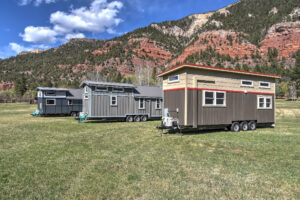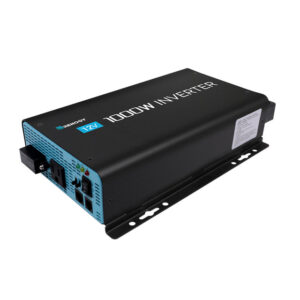
Key Takeaways
-
FranklinWH aPower solar batteries provide reliable off-grid power, even in adverse weather conditions.
-
Understanding the basics of solar battery technology is essential for choosing the right system for your needs.
-
Comparing specifications like cost, efficiency, depth of discharge, and temperature resistance helps in making an informed decision.
-
Proper installation and maintenance are key to maximizing the performance and longevity of your solar battery system.
-
Future-proofing your energy system with expandable and upgradable options like FranklinWH aPower is a smart investment.
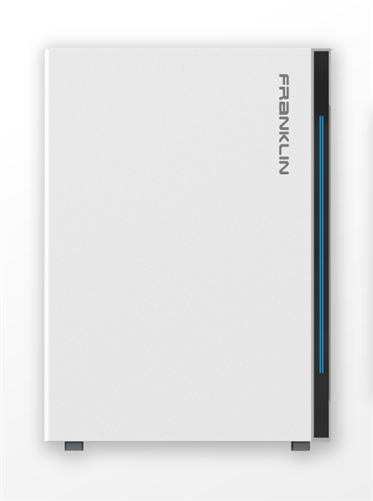
Braving the Storm with FranklinWH aPower Solar Batteries
When the sky darkens and the winds howl, you want to be sure that your home remains a beacon of light and warmth. That’s where FranklinWH aPower solar batteries come into play. These batteries are not just your average energy storage devices; they are the guardians of your home’s power, designed to keep the lights on when the weather outside does its worst.
Why Off-Grid Solar is Your Weatherproof Ally
Solar power is often associated with sunny skies, but the truth is that solar energy systems, especially those equipped with batteries, are incredibly resilient in bad weather. With a FranklinWH aPower solar battery, you’re not just harnessing the sun’s energy; you’re storing it for the stormy days. This means that when the grid fails, your off-grid system keeps you powered.
FranklinWH aPower Solar Batteries at a Glance
The FranklinWH aPower system is not just about storage; it’s about smart energy management. It comes with a built-in inverter and is AC-coupled, which means it can integrate seamlessly with your existing solar panels. Most importantly, it boasts a 12-year warranty, ensuring that your investment is protected for years to come.
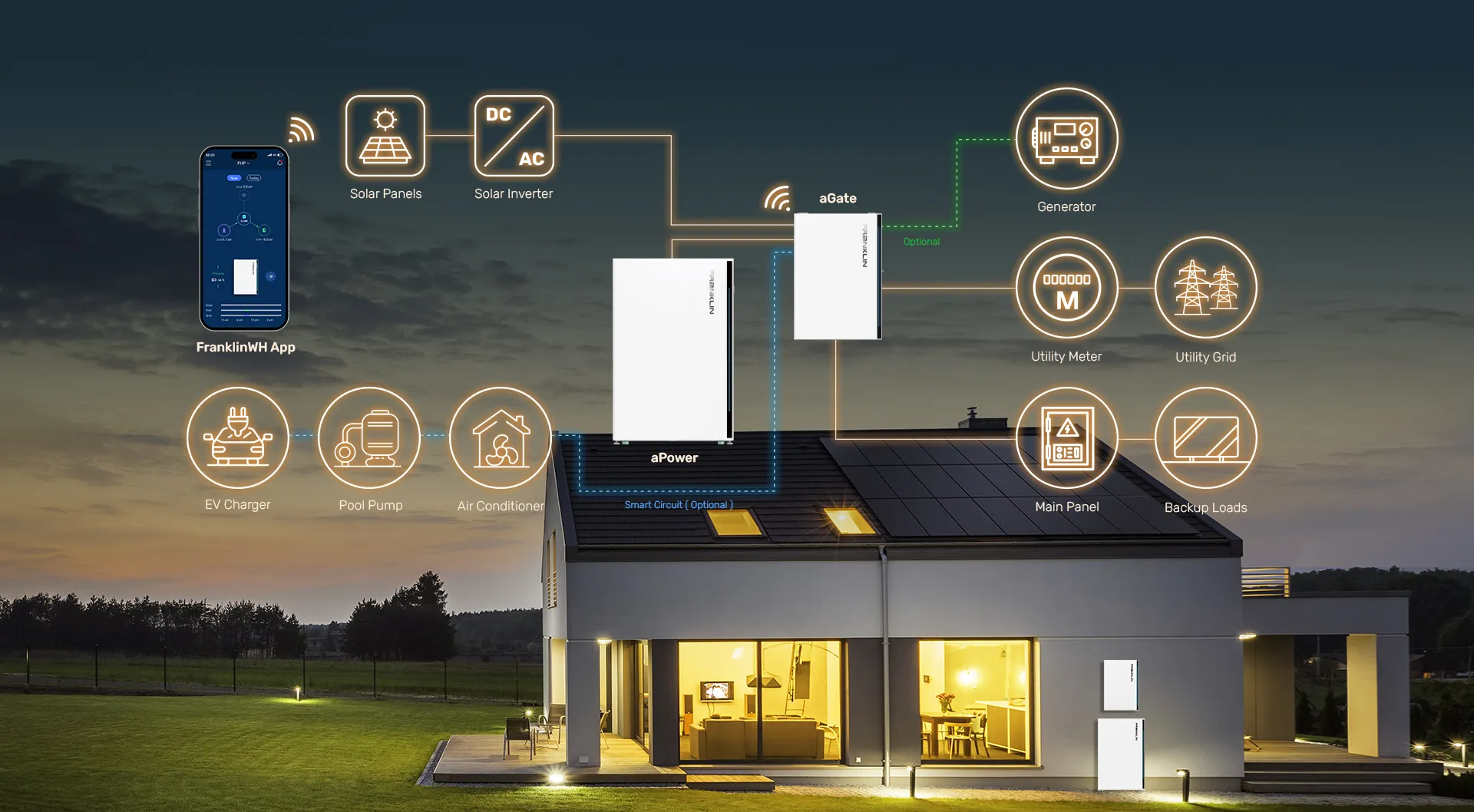
Fundamentals of Off-Grid Solar Battery Systems
Understanding Solar Battery Basics
Before diving into the specifics of FranklinWH aPower batteries, let’s take a step back and understand the basics of solar batteries. These devices store excess energy generated by your solar panels for use when the sun isn’t shining. They’re measured in terms of capacity—how much energy they can store—and power—how much energy they can provide at any given moment.
The Anatomy of aPower Solar Batteries
The FranklinWH aPower solar battery is a powerhouse with a capacity of 13.6 kilowatt-hours (kWh). It’s designed to meet the energy needs of most households, ensuring that even during extended power outages, you can keep your essential appliances running. With the ability to manage loads dynamically, it maximizes every kilowatt-hour stored.

Choosing the Right Solar Battery for Your Needs
Choosing a solar battery is a big decision. You’ll want to consider your energy needs, the climate you live in, and your budget. Let’s break down what you need to know to make an informed choice.
Deciphering Specifications and Features
When comparing solar batteries, pay close attention to:
-
Capacity: How much energy the battery can store, usually measured in kilowatt-hours (kWh).
-
Power rating: The amount of electricity that can be delivered at once, measured in kilowatts (kW).
-
Depth of Discharge (DoD): The percentage of the battery’s capacity that has been used. Higher DoD means you can use more of your battery’s stored energy.
-
Round-trip efficiency: How much energy put into the battery can actually be used. Higher efficiency means less energy is lost during storage and retrieval.
These specs will guide you to a battery that meets your needs both in terms of energy storage and output.
FranklinWH aPower Solar Battery Specifications
|
Criteria |
FranklinWH aPower |
|---|---|
|
Cost |
$11,000 (battery alone), $18,000 (full installation), $12,600 (net cost after 30% federal clean energy tax credit) |
|
Efficiency |
89% round-trip efficiency |
|
Capacity |
13.6 kWh |
|
Power Rating |
5 kW continuous power, 10 kW peak power (10s) |
|
Temperature Resistance |
Operates from -4°F to 122°F [-20℃ to 50℃] |
|
Lifespan |
12-year warranty |
Sources: 1. solar.com 2. energysage.com 3. franklinwh.com
Cost
The cost of solar batteries can vary widely. While the upfront cost of a FranklinWH aPower battery may be higher than some other options, it’s important to consider the long-term value. The extended warranty and robust design can lead to savings over time by reducing the need for replacements and maintenance.
Efficiency
Efficiency is key when it comes to solar batteries. The FranklinWH aPower is designed to minimize energy loss, which means more of the energy your solar panels produce is available for use. This efficiency can make a big difference in your system’s overall performance, especially during long periods without sunlight.
Depth of Discharge
Depth of Discharge (DoD) is crucial for battery life. The FranklinWH aPower allows for a high DoD, which means you can use more of your battery’s stored energy without compromising its lifespan. This is especially useful during extended outages or cloudy days when you need to rely on your stored power the most.
Temperature Resistance
Batteries can be sensitive to temperature extremes, but the FranklinWH aPower is designed to withstand a wide range of temperatures. This resilience is essential for maintaining performance and longevity, regardless of where you live.
Lifespan
The lifespan of a solar battery is affected by many factors, including usage patterns, maintenance, and environmental conditions. With its 12-year warranty and robust construction, the FranklinWH aPower is built to last, giving you peace of mind that your investment will stand the test of time.Maximizing Performance in Harsh Conditions

Design Features for Durability
The aPower battery isn’t just about capacity; it’s also built to last. Its robust design ensures that it can withstand temperature fluctuations and other environmental stressors. This means that whether you’re in the scorching heat of the desert or the freezing cold of the north, your aPower battery is designed to keep performing.
Optimizing your battery’s capacity is crucial, especially when you’re dealing with varying weather scenarios. Here’s how you do it:
-
Regularly check your battery’s state of charge and health.
-
Ensure your solar panels are clean and unobstructed to maximize energy capture.
-
Use energy management tools to prioritize the use of stored power for essential loads during bad weather.
By following these steps, you can ensure that your aPower solar battery provides reliable power when you need it most.
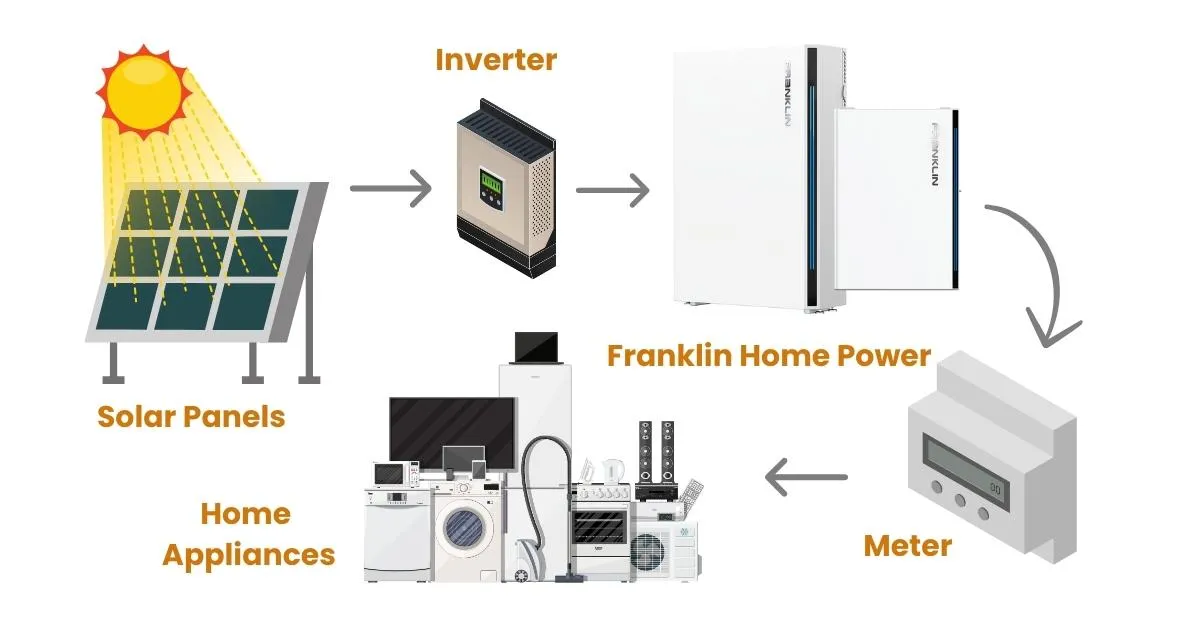
Installation and Maintenance for Resilience
When you decide to go off-grid with solar batteries, proper installation is critical. With FranklinWH aPower batteries, it’s best to work with a certified installer. They’ll know exactly how to shield your system against the elements, ensuring that every connection is secure and every component is properly placed to avoid damage during extreme weather.
Securing Your System Against Extreme Weather
Extreme weather calls for extreme measures. To safeguard your aPower solar battery system:
-
Install it in a location that’s protected from direct exposure to harsh weather, like heavy snow or intense heat.
-
Ensure that the installation site has good drainage to avoid water accumulation.
-
Consider a protective enclosure if the battery will be exposed to the elements.
These steps will help maintain the integrity of your solar battery system, no matter what Mother Nature throws your way.
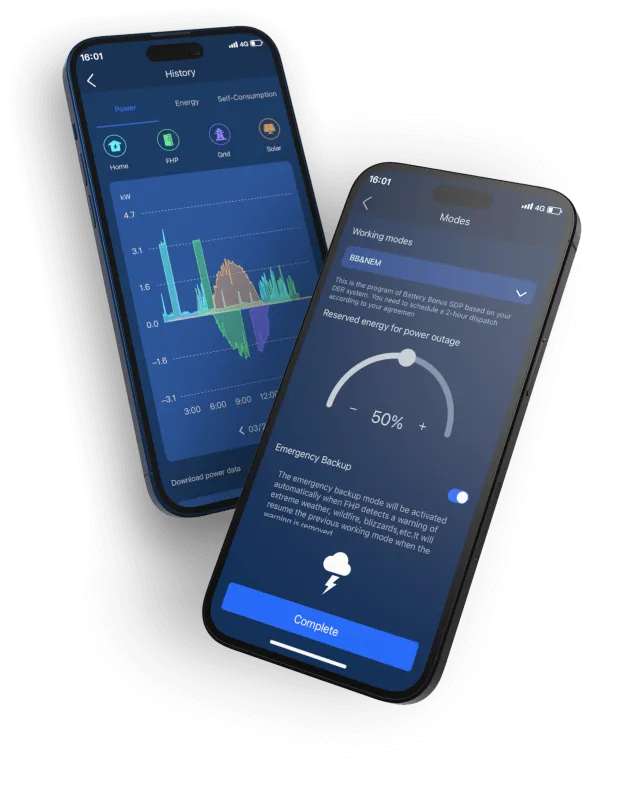
Best Practices for Solar Battery Longevity
To get the most out of your FranklinWH aPower solar batteries, stick to these best practices:
-
Avoid completely draining your battery; instead, maintain a minimum charge level to prevent undue stress.
-
Perform regular maintenance checks, such as inspecting connections and monitoring battery health.
-
Use energy management systems to optimize battery charge and discharge cycles, prolonging battery life.
Following these guidelines will help ensure your solar batteries last as long as possible, providing you with dependable power year after year.
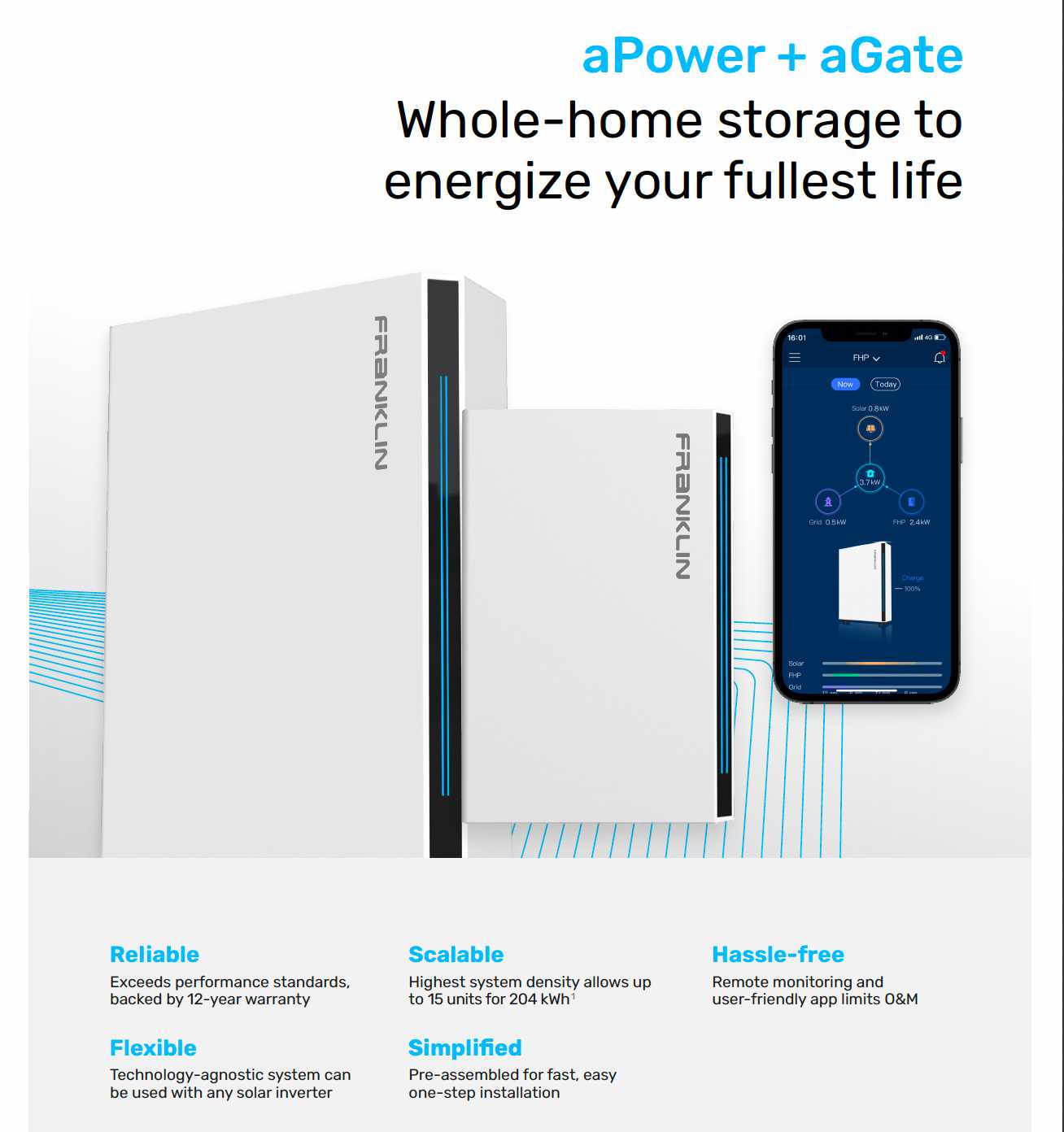
Future-Proof Power: The aPower in an Evolving Energy Landscape
The energy landscape is changing rapidly, with new technologies and shifting policies. Investing in a solar battery system like the FranklinWH aPower means choosing a solution that can adapt to these changes. With the ability to expand and upgrade your system, you’re not just buying a battery; you’re investing in a flexible and future-proof power solution.
Trends in Off-Grid Technology
The realm of off-grid technology is advancing at an impressive pace. Innovations in battery chemistry, smart grid integration, and renewable energy sources are making off-grid systems more efficient, affordable, and reliable. The FranklinWH aPower solar battery is part of this exciting trend, with its advanced features and capabilities that push the boundaries of what off-grid systems can achieve.
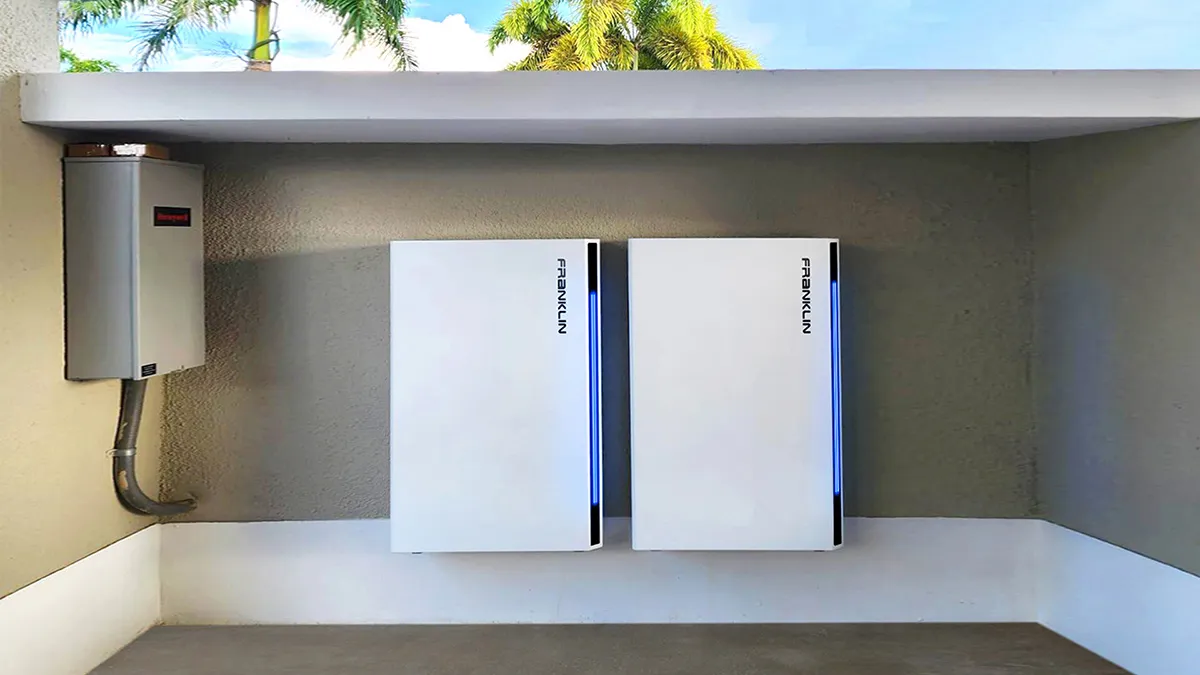
Expandability and Upgradability of FranklinWH aPower
One of the most compelling features of the FranklinWH aPower system is its expandability and upgradability. As your energy needs grow, so can your battery system. This flexibility ensures that your investment is not only protected but can evolve with the latest advancements in solar technology.
Frequently Asked Questions (FAQ)
Can I rely solely on the aPower system during extended outages?
Absolutely. The FranklinWH aPower solar battery is designed to provide you with power during extended outages. With its substantial capacity and smart load management, you can prioritize essential appliances and maintain power for critical needs throughout the duration of most outages.
How does the FranklinWH aPower perform in colder climates?
The aPower battery is engineered to operate effectively in a range of environmental conditions, including colder climates. Its robust construction and temperature management systems ensure consistent performance, even when the mercury drops. However, as with all batteries, extreme cold can affect performance, so it’s important to install the battery in a location that mitigates exposure to severe cold.
Is the installation of the aPower system a DIY project?
While some solar projects can be DIY, the installation of a FranklinWH aPower system is best left to the professionals. Certified installers have the expertise to ensure that your system is installed safely and optimized for your specific needs and site conditions.
What maintenance routines are required for the aPower battery?
To ensure the longevity and performance of your aPower battery, a few simple maintenance routines are recommended:
-
Keep the battery clean and free from dust and debris.
-
Inspect the connections periodically to ensure they are tight and free from corrosion.
-
Monitor the battery’s state of charge and health through the system’s management software.
-
Ensure the environment around the battery remains stable and within the recommended temperature range.
These simple steps can help maximize the life and performance of your aPower battery.
How does load management with aPower contribute to resilience?
Load management is a critical feature of the aPower system that contributes significantly to its resilience. By intelligently prioritizing and controlling the power usage of different appliances and systems in your home, the aPower ensures that the most important loads are maintained during outages, and power consumption is optimized to extend the battery’s life and performance.

